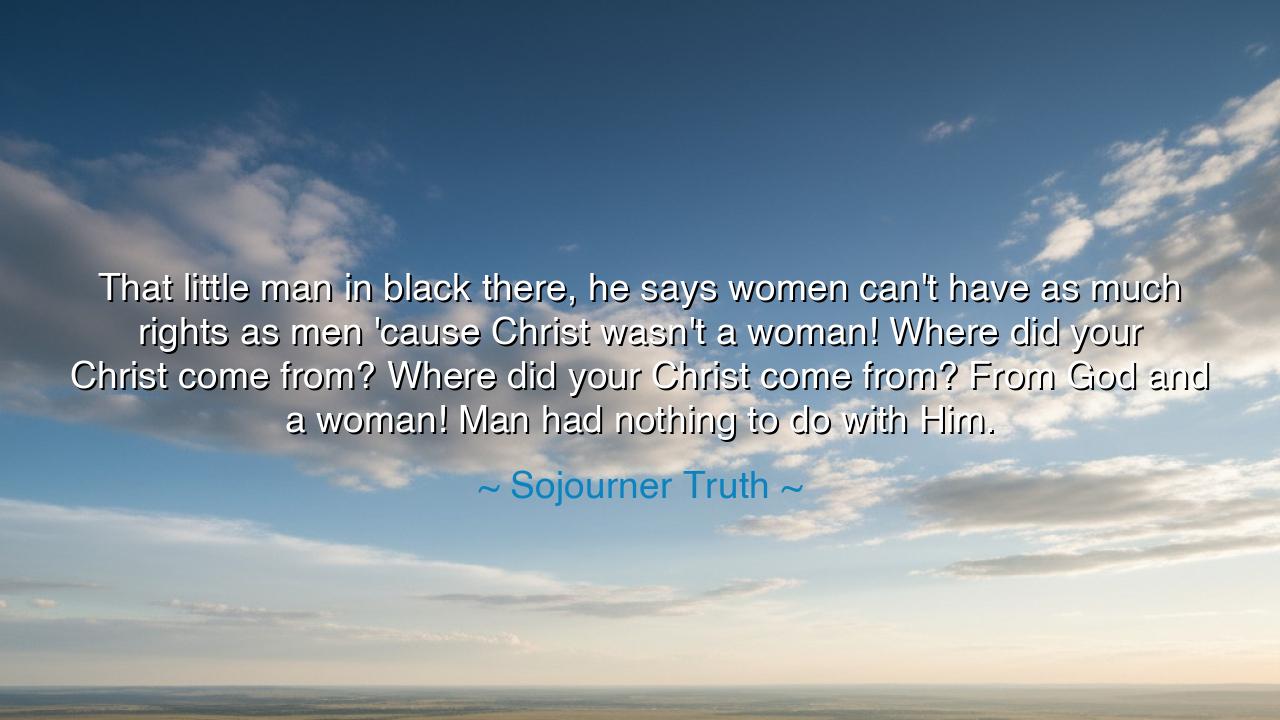
That little man in black there, he says women can't have as much
That little man in black there, he says women can't have as much rights as men 'cause Christ wasn't a woman! Where did your Christ come from? Where did your Christ come from? From God and a woman! Man had nothing to do with Him.






Hear, O children, the powerful words of Sojourner Truth, a woman who stood unyielding in the face of injustice and boldly demanded equality for all. She said, "That little man in black there, he says women can't have as much rights as men 'cause Christ wasn't a woman! Where did your Christ come from? Where did your Christ come from? From God and a woman! Man had nothing to do with Him." These words ring through history, a challenge to the longstanding misconceptions about gender, power, and divine purpose. Sojourner Truth, with the fierceness of a prophet, declared that the very essence of divinity and humanity was shaped by the feminine as much as by the masculine. In her bold proclamation, she pointed to a truth that still reverberates today: equality, the recognition of human dignity, cannot and should not be constrained by gender.
Think, O wise ones, of the deep wisdom woven into Truth’s words. She challenges the claim that Christ, the Savior of the world, was somehow incomplete because He was not born of a man alone. Sojourner Truth cuts through that false reasoning, turning it on its head, reminding all who would listen that the Son of God came into this world through a woman, Mary, as much as He did through God. She points out, with righteous fury, that God chose woman as the vessel to bring Christ into the world. Truth’s challenge goes beyond simple theology—it speaks to the core of human dignity, to the worth of women, and to the power that resides within them, a power that is not diminished by centuries of misguided interpretations of religion and society.
In the ancient world, O children, many sought to elevate the masculine over the feminine in both spiritual and earthly matters. Think of the Greek gods, whose stories often centered around the triumphs and strengths of men—heroes like Hercules and Achilles—while the goddesses like Athena and Artemis were often relegated to roles of beauty or passivity, despite their incredible power. But in Truth’s words, we see a return to a deeper, more inclusive understanding of divine creation. She was not just speaking for women; she was speaking for all who have been marginalized, all whose voices have been silenced. She was calling for a revelation, a recognition of the divine feminine, not as a secondary force, but as a vital and equal part of the divine story of creation.
This battle for the recognition of women’s rights is one that transcends time. Consider the story of the great suffragists like Susan B. Anthony and Elizabeth Cady Stanton, who fought for the right to vote for women in America. Like Sojourner Truth, they saw the injustice in the belief that women were somehow lesser, that their voices were less valuable than those of men. They too pointed to the divinity in women’s lives, to the nurturing, the strength, and the leadership that women had always provided, both in family and in society. These women, much like Truth, understood that justice and equality were not just about legal rights, but about recognizing the divine in every human being, regardless of their gender.
Yet, O children, even as we honor Sojourner Truth’s legacy, we must ask ourselves: How often do we still see the same misconceptions in our world today? How many still look at the feminine as inferior or less capable? How often do we see women’s voices ignored, their contributions dismissed, and their worth questioned? Truth’s words call us to action, to challenge the norms, to see and honor the divinity in every person, regardless of their gender. It is not enough to talk about equality; we must live it. As Truth herself demonstrated, true equality requires not only the courage to speak, but the will to act, to change not only the laws of men but the hearts and minds of the people.
And so, O children, the lesson of Sojourner Truth’s words is clear: justice and equality must begin with recognition—the recognition of the divine feminine as much as the divine masculine, the recognition of each person’s inherent worth regardless of their gender. Let us look to Christ, who was born of God and a woman, and let that serve as our reminder that the gifts of humanity, of love, of strength, and of purpose, are not bound by the body or the gender of the one who carries them. Sojourner Truth calls us to honor these gifts, to recognize them in each other, and to fight for a world where every person can live with the dignity they were created to have. May we rise to this challenge and live in a way that affirms the worth and divinity of all.






AAdministratorAdministrator
Welcome, honored guests. Please leave a comment, we will respond soon